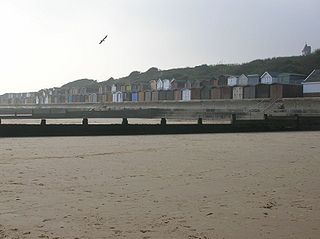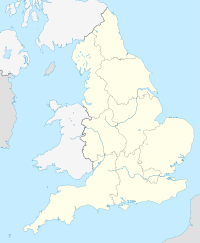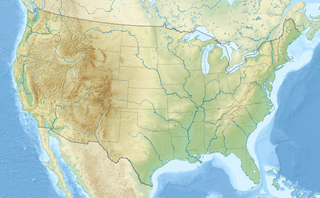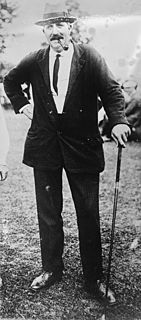
The Ryder Cup is a biennial men's golf competition between teams from Europe and the United States. The competition is contested every two years with the venue alternating between courses in the United States and Europe. The Ryder Cup is named after the English businessman Samuel Ryder who donated the trophy. The event is jointly administered by the PGA of America and Ryder Cup Europe, the latter a joint venture of the PGA European Tour (60%), the PGA of Great Britain and Ireland (20%), and the PGAs of Europe (20%).
The Irish Open is a professional golf tournament on the European Tour. Since 2015, the Irish Open has been hosted by Rory McIlroy, and his charitable foundation is the main benefactor; the title sponsor is Dubai Duty Free.
Samuel Ryder was an English businessman, entrepreneur, golf enthusiast, and golf promoter. He originated the idea of selling garden seeds in "penny packets" and built a very successful business on the concept.
Norman Vico Drew is a Northern Irish professional golfer. He was the first golfer to play in the Walker Cup, Ryder Cup and Canada Cup. He was renowned for his short game.
Peter Joseph Butler is an English professional golfer. He was one of the leading British golfers of the 1960s and early 1970s. He won a number of important tournaments, played in four Ryder Cup matches between 1965 and 1973 and featured in the top 60 on the British and later European Tour Order of Merit every year from 1959 to 1978.
The British PGA Matchplay Championship was a match play golf tournament that began in 1903 and ran until 1979. Between 1903 and 1969, the event was sponsored by the now defunct British newspaper the News of the World, and was commonly known by the paper's name. Initially organised as the championship of British professionals, the event came to include invited players from other countries – in particular from around the Commonwealth. On occasion, American professionals also took part, notably in 1949 when eight members of the victorious U.S. Ryder Cup side accepted invites to the event, Lloyd Mangrum reaching the semi-finals.
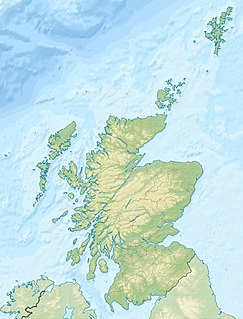
The 1937 Open Championship was the 72nd Open Championship, held 7–9 July at Carnoustie Golf Links in Carnoustie, Scotland. Henry Cotton won the second of his three Open titles, two strokes ahead of runner-up Reg Whitcombe. The Ryder Cup was held in late June at Southport and Ainsdale Golf Club in North West England, and all the members of the victorious American team played in the championship, creating a star-studded field, similar to four years earlier in 1933.
Archibald Edward Wones Compston was an English professional golfer. Through the 1920s he built a reputation as a formidable match play golfer, in an era when many professionals made more money from "challenge" matches against fellow pros, or wealthy amateurs, than from tournament golf.

Henry Abraham Mitchell was an English professional golfer. Mitchell had eight top-10 finishes out of 17 appearances in the Open Championship, his best performance being fourth in 1920. He was runner-up in the 1912 Amateur Championship and won the 1924 Miami Open.
Arthur Lees was an English professional golfer who played from the 1930s to 1960s. He was a member of four Great Britain Ryder Cup teams in the late 1940s and 1950s, and won several tournaments in Europe during his career. In addition, he spent nearly 30 years as the head professional of Sunningdale Golf Club, holding the position until he was almost 70 years old.

The Yorkshire Evening News Tournament was an international golf tournament in the English Yorkshire area before the European Tour was founded. It was a match play tournament for most of its existence, but switched to stroke play in the 1940s. The tournament was played annually from 1923 to 1963, with no tournaments held during World War II.

Aubrey Basil Boomer was a professional golfer who played in the early 20th century. Boomer had three top-10 finishes in the Open Championship. He was a frequent competitor in the French Open and won the event five times.
The Roehampton Invitation Tournament was a British golf tournament played each April at the Roehampton Club from 1920 to 1935. From 1922 the tournament was played over three days. There was 36 holes of stroke play on the first day with the leading 16 players qualifying for a knock-out contest on the following two days. Except in 1920 the total prize money was £200. A challenge cup was awarded to the winner to remain the absolute property of any player who won the tournament on two occasions, not necessarily consecutive. Three players won the cup outright: Abe Mitchell, Mark Seymour and Archie Compston. The tournament was cancelled in 1936 because of "the crowded state of the fixture list".
The Glasgow Herald Tournament was a British golf tournament played at Gleneagles from 1920 to 1927. The 1920 event had prize money of £650, then the largest ever in a British tournament. From 1921 the prize money was increased further, to 1,000 guineas (£1,050), a new record. The first prize increased from £160 to £200. From 1921 the event was often called the Glasgow Herald 1000 Guineas Tournament.

The Ryder Tournament was a professional golf tournament played at Verulam Golf Club in St Albans, England and sponsored by the Samuel Ryder. The event was held just once, in 1928, and had total prize money of £500.
Patrick Joseph Mahon was an Irish professional golfer. He was one of the leading Irish professionals of the 1930s and had one exceptional season, 1937, where he was runner-up in three important British tournaments, third in another, finished second in the Harry Vardon Trophy standings and won the Irish Professional Championship. He won the Western Isles Open Championship in 1935 and won the Irish Professional Championship again in 1938 and 1939.

